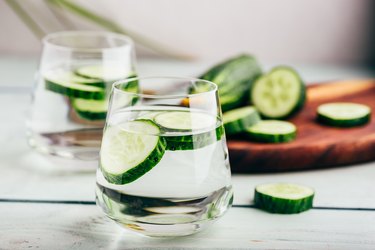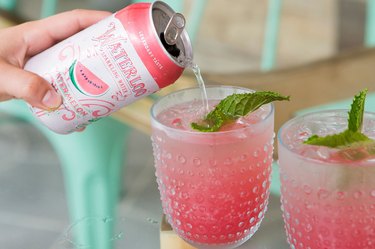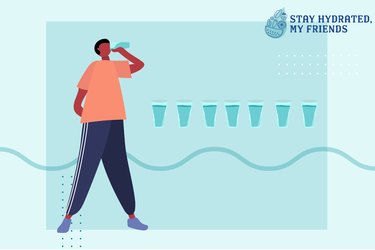
Water is essential for your health: It regulates body temperature, lubricates joints, flushes waste from the body and so much more, according to the Centers for Disease Control and Prevention (CDC). But let's be honest: It's not the most exciting drink on the menu.
One popular way to make water more tasty is to infuse it with fruits and veggies — which adds more than just flavor. Here, we take a look at exactly what cucumber water is good for.
Video of the Day
Video of the Day
1. Keeps You Hydrated
"The main way it's good is for hydration," Carissa Galloway, RDN tells LIVESTRONG.com. "It's a fun way to get more water with a spa-like feel that can help those who don't like water, which can help many things from energy to focus, digestion and skin."
Drinking water in general is a great way to avoid being dehydrated, and according to the MD Anderson Cancer Center, the side effects of dehydration include much more than just being thirsty. Some symptoms are:
- Headache
- Dizziness
- Sleepiness
- Decreased skin elasticity
- Low blood pressure
But you can also eat hydrating foods: As a vegetable that is almost 100 percent water, cucumber is a simple way to add an extra source of hydration to your glass of water. Plus, the taste makes it more appealing and can potentially influence you to drink more.
"It actually tastes good," Galloway says, "No matter how good you think something is for you, if it doesn't taste good, then you won't consistently consume it."
In case you were wondering if you could drink cucumber water every day, "There is no risk," Galloway says, "as we need to hydrate daily, so I say drink up!"
2. Delivers Essential Nutrients
Frances Largeman-Roth, RDN recommends eating the cucumber once you finish drinking your water for maximum benefit.
"It's unclear how many of the nutrients in a fruit or vegetable actually end up in the water," she says. "If you eat the veggies as well, you'll be getting more nutrients."
Those nutrients include fiber, calcium, iron, magnesium, phosphorus, zinc and vitamin K according to the USDA.
"A medium cucumber has 57 percent of your daily value for vitamin K," Largeman-Roth says, "which is important for blood clotting and bone health."
3. Contains Antioxidants
Antioxidants protect your body from free radicals — molecules that cause oxidative stress to the cells, potentially causing inflammation or playing a role in cancer, heart disease and other diseases, according to the Mayo Clinic.
"When we increase the amount of antioxidants in our daily diet, then we are giving our body the support it needs to fight cell damage and ideally delay or prevent these conditions from occurring," Galloway says.
Antioxidants can be found in most fruits and vegetables as vitamins A, C and E, she says, which is part of the reason why she recommends including plenty of fresh produce in your diet.
Cucumbers have a variety of antioxidants, including several flavonoids, a group of plant chemicals found in many fruits and vegetables, Galloway says. Cucumber's antioxidants include:
- Vitamin C
- Beta-carotene
- Manganese
- Fisetin
Research suggests these antioxidants are linked with reduced disease risk. For example, a July 2012 study in Biochemical Pharmacology evaluated fisetin's effects on melanoma and cancers of the pancreas, prostate and lungs. Researchers observed the effect the flavonoid had on cancerous cells from patients with prostate cancer and lung cancer. They concluded that fisetin stopped cell growth within prostate cancer cells.
Further research is needed, Galloway says, but the results suggest there may be a link between fisetin and a reduced risk in prostate cancer.
4. Linked to Weight Loss
"Cucumber-infused water could be potentially helpful for weight loss if you're drinking it instead of sweetened beverages, like sodas and juice drinks," Largeman-Roth says.
One-third of a medium cucumber has only 10 calories, according to the FDA and water has no calories. Compare that to around 150 in the average 12-ounce can of soda. Over time, replacing sugary drinks with cucumber water can dramatically reduce your calorie intake.
Galloway calls this a "lifestyle swap" because it can improve your health for years to come if maintained.
"For example, if you replace a 200-calorie drink with zero-calorie cucumber water every day, in a year you will have cut 73,000 calories," Galloway says, "which if you use the 3,500 calories equals 1 pound equation, could result in roughly a 20-pound weight loss from one simple swap."
Additionally, cucumbers are low-energy-dense foods because "water lowers the energy density of foods," according to the CDC. Cucumbers are 96 perfect water, Largeman-Roth says.
In an April 2016 systematic review in Nutrients, researchers examined the relationship between the energy density of food and body-weight changes in adults with obesity. They found low-energy-dense foods — which were high in water and fiber — were associated with weight loss.
Related Reading
How to Make Cucumber Water
Now that you know the benefits, the next step is to actually make your own cucumber water.
It's a super simple recipe: Slice your desired amount of cucumber and drop the slices in your water. You can even use sparkling water and garnish with mint or citrus, like in our Sparkling Cucumber Refresher recipe. (The benefits of lemon water on its own are enough to include the yellow fruit in your glass, but a lemon and cucumber combo makes for an even tastier sip.)
After you make a batch, cucumber-infused water can be kept in your fridge for up to 3 days, according to Largeman-Roth.
- CDC: "Water and Nutrition"
- The University of Texas MD Anderson Cancer Center: "Dehydration"
- USDA:"Cucumber, raw"
- Mayo Clinic: "Antioxidants"
- Biochemical Pharmacology: "Dietary flavonoid fisetin: A novel dual inhibitor of PI3K/Akt and mTOR for prostate cancer management"
- FDA: "Nutrition for Raw Vegetables"
- CDC: "Low-Energy-Dense Foods and Weight Management"
- Nutrients: "Link between Food Energy Density and Body Weight Changes in Obese Adults"
- Cleveland Clinic: "Are There Any Health Benefits to Drinking a Gallon of Water a Day?"
- Clinical Cases in Mineral and Bone Metabolism: "Vitamin K and bone"
Was this article helpful?
150 Characters Max
0/150
Thank you for sharing!
Thank you for your feedback!

